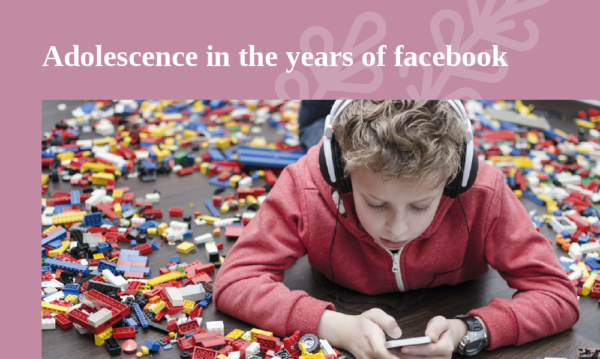Today’s teenagers are incredibly familiar with technology in general and particularly with the Internet and the multitude of possibilities – applications it offers. In recent years, social media (Facebook, Instagram, Facetime, Twitter) has become particularly popular among young people and adults. Today’s young teenagers from a very young age have their page (e.g., Facebook), in which they devote much of their free time daily. By using the most popular social networking page (Facebook), teenagers follow the trend of the time that commands old friends’ finding or establishing new friendships via the Internet. Their Facebook world is a one-way street, as it is considered the most appropriate way to communicate and develop relationships nowadays.
However, social media presupposes the assignment by users (adolescents) of personal information and often sensitive data. However, apart from the various immediate dangers that lurk from the reckless use of Facebook (e.g., child seduction, pedophilia), their exposure to the “magic” world of Facebook affects many aspects of their personality and everyday life in the long run. At this point, we should recall that children, especially adolescents, are at a sensitive age period where, in their attempt to shape their personality, beliefs, and autonomy, they can easily be influenced by misguided or distorted patterns of behavior and values.
External appearance
Undoubtedly, adolescence is when children are mainly concerned about their appearance, as they need acceptance and being part of a peer group. Trying to harmonize with the various trends and “values” of their time, with a typical example that the individual’s external appearance must be the first and exclusive criterion for his acceptance, today’s young people present narcissistic tendencies. These trends meet a fertile ground in the image-dominated world of Facebook, are magnified, and introduce teenagers to a vicious cycle of vanity. Thus, it is not uncommon for young people to have permanent anxiety about whether the photo they posted on their profile will collect many likes and comments. Also, in their effort to be accepted by both their real friends and the “internet,” there is a distortion of the concept of external appearance, whose continuous improvement becomes purpose. That results in frequent and often challenging changes to their body image (shaving and dyeing hair, earrings and tattoos throughout the body, inappropriate clothing), with the sole criterion of their choice being the acceptance of peers or non-peers. The majority of today’s teenagers have learned to focus exclusively on “appearance” and not cultivating their “being,” personality, character, and skills.
Friendly and love relationships
When direct communication and close human relations have been replaced by easy and impersonal communication via the Internet and the accumulation of dozens of “friends” on various social media, the transformation in love and friendly relationships is a natural consequence. These relationships are mostly characterized by superficiality, hypocrisy, and lies. An important factor, among other things (general alienation, a crisis of moral principles and values, etc.) that contributes to this change in relationships is Facebook, as it allows its users to embellish themselves and present them in a way that does not correspond to reality. Therefore, these relationships are precarious and false because they are based on superficial and vain behaviors and claims, making them temporary and meaningless. Are the countless friends of photos and various publications real friends who will stand by in difficult times or smiles and hugs disappear as soon as the camera is off?
The result is that young children lose moments from their adolescence, from the most carefree period of their lives, since to no small extent, they do not enjoy real life. Their unconscious purpose is to fulfill the modern superficial and consumer (in products and relationships) standard of life. Eventually, they end up trapped in a vicious cycle of superficial satisfaction and vanity as their lives unfold behind the security offered to them by the screen.
Undoubtedly the above phenomena and concerns also apply to adults involved in social media. Still, adolescents are more vulnerable to the various dangers that exist more generally on the Internet (incidents of pedophilia, distorted presence of reality). They are going through a susceptible period during which they form their internal identity and character. Their identity’s normal development can easily be altered by the pretentious and fake world of Facebook and the Internet in general, with undeniable – negative consequences in their later lives.
Parents should stand close to children, talk to them about the dangers of using Facebook recklessly for their personal and social lives, and, if possible, monitor the material and information to which their children are exposed. The parents will provide children with the confirmation and praise they need in terms of their image and skills to increase their self-esteem and not need the “confirmation” of online friends. Finally, we should not forget that the parent’s role as a model of behavior and personality and the family environment plays a critical role in developing children and adolescents into healthy adults with good communication and relationship skills.


